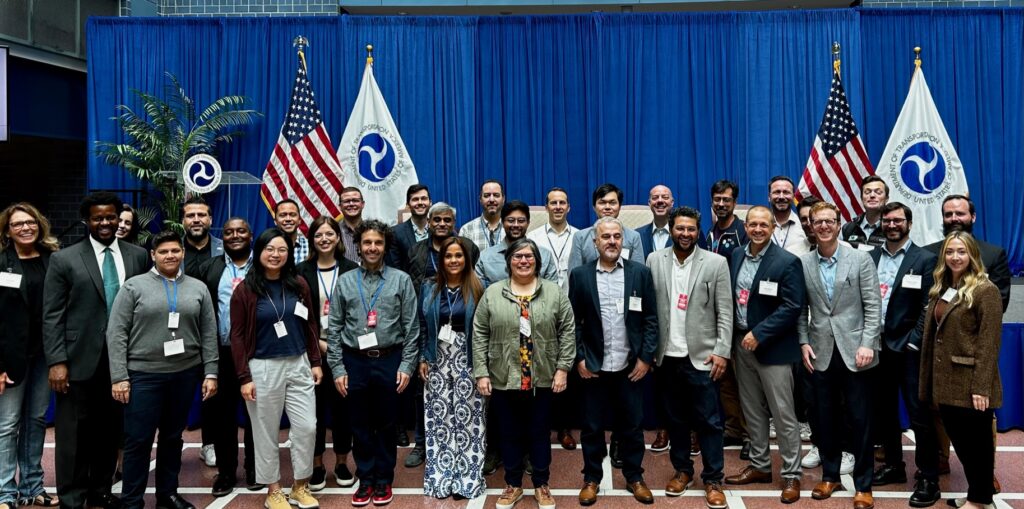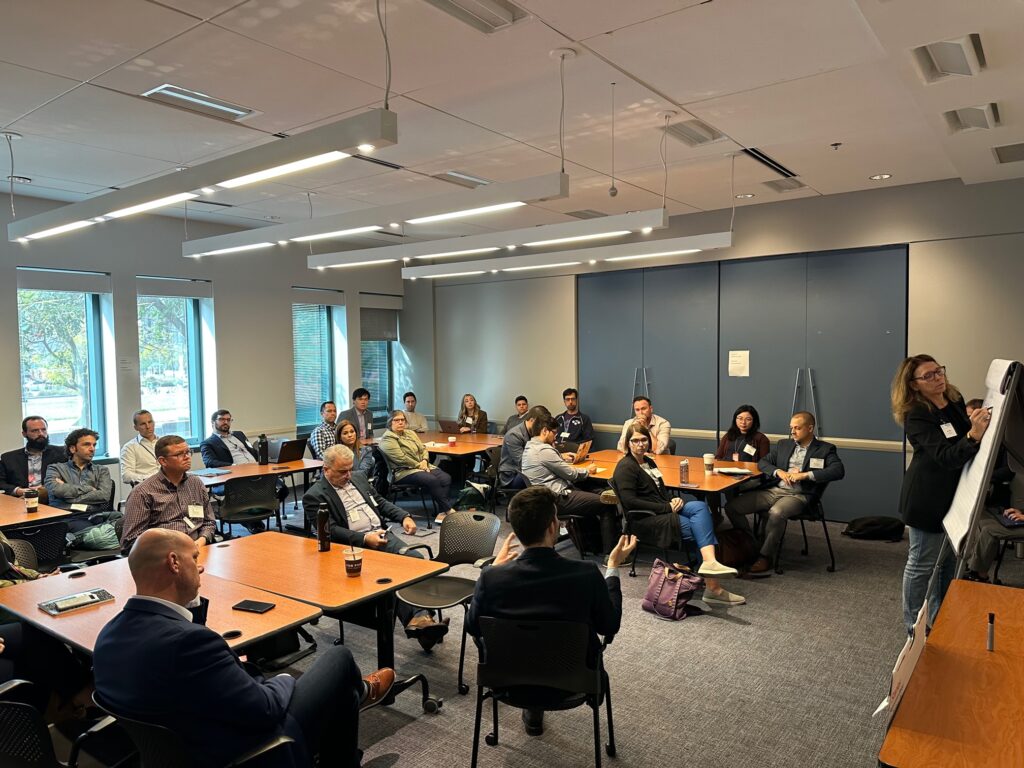REDEFINING CIVIC INNOVATION
Government and bureaucracy are often synonymous with long, cumbersome processes. The new SMART Grant program by the USDOT is trying something different. This iterative approach is essential to civic innovation but is often at odds with the systems and processes of government. In an OpEd for Forbes written more than a decade ago, Jennifer Pahlka said, “If there’s one thing government needs desperately, it’s the ability to quickly try something, pivot when necessary, and build complex systems by starting with simple systems that work and evolving from there, not the other way around.”
If there’s one thing government needs desperately, it’s the ability to quickly try something, pivot when necessary, and build complex systems by starting with simple systems that work and evolving from there, not the other way around.
– Jennifer Pahlka
The USDOT SMART Grant program was established to conduct demonstration projects focused on advanced smart city or community technologies and systems that will improve transportation efficiency and safety. It funds purpose-driven innovation and focuses on building data and technology capacity and experience for State, local, and Tribal governments. The program is unique in that it encourages a rapid “build, measure, learn” cycle that helps push innovation forward and allows organizations to solve problems more effectively and efficiently.

The SMART Grant Collaborative is an initiative of the Open Mobility Foundation (OMF) that brings together eight public agencies awarded USDOT SMART Grants around curb management: Seattle, Portland, San Francisco, San Jose, Los Angeles, Minneapolis, Philadelphia, and Miami-Dade County. While each city’s project is unique, all share a similar problem and technological approach, specifically to digitally gather and analyze curb information to reduce congestion, enhance livability, and provide the tools to address equity and improve safety on city streets. The shared, open-source Curb Data Specification (CDS) stewarded by the non-profit Open Mobility Foundation (OMF) lies at the heart of this collaboration. CDS enables data to be gathered and analyzed such that cities can more optimally use their curbs and dynamically respond to emerging policy needs through experimentation, piloting, and prototyping.
TACKLING PROCUREMENT
Often the first and biggest challenge of them all is simply buying the needed software and services, known as procurement. A procurement process alone can take years, which doesn’t account for the time required to ramp up and implement the chosen product or solution. With that timeline, forward-thinking startups serving public agencies struggle to survive. Far too often, the technology government acquires is out of date. And, teams and departments within public agencies are unable to deploy modern solutions that best serve their communities.

That’s why finding innovative procurement approaches that align with city values and utilize CDS was a key issue to tackle in the early days of the SMART Grant Collaborative. The members of the group began with their internal research and processes. Then, they participated in a series of workshops and discussions on the issue. Topics discussed included components, privacy, security, interoperability, and data standards – culminating in a review of different strategies to secure the right technology and services to ensure successful, timely delivery of program goals. One of the strategies that stood out was collaborative procurement: the practice of multiple organizations coming together to order the common goods and services they share.
A COLLABORATIVE MODEL
Sourcewell is an organization that helps government, education, and nonprofit organizations with cooperative purchasing. A self-sustaining government agency based in Minnesota, their team helps streamline the procurement process by developing RFPs and managing the process for national, competitive solicitations that meet or exceed local requirements. Sourcewell awards supplier contracts and any government entity can quickly and easily use those contracts to serve their individual project needs.
In service of the SMART Collaborative, Sourcewell developed and managed an RFP for “Curb Management Technologies with Related Services,” awarding contracts to 17 companies that provide advanced technologies and systems to improve transportation efficiency, including:
- Digitization of curb inventory and regulations
- Historic and/or real-time monitoring and performance reporting
- Curb availability (parking, loading, etc.), reservations, and driving directions
- Predictive modeling
- Data management and integration
Of the 17 awardees, many are OMF members and have demonstrated a willingness to work alongside cities to develop open standards that help public agencies accomplish their mobility policy goals. Furthermore, membership in the OMF indicates a deeper knowledge and understanding of the Curb Data Specification (CDS). Sourcewell has a unique, collaborative process: these contracts are now available for any government agency to use, whether they are part of the SMART Collaborative or not.
Learn more about OMF’s members and see Sourcewell details, where relevant here:
| COMPANY | ABOUT | JOINED | LEVEL | SOURCEWELL INFO |
| Blue Systems | Blue Systems harnesses the knowledge and expertise of its subsidiaries to create ecosystems that optimize the flow of people, equipment and data. | June 2019 | Premier | Link here |
| Passport | Passport’s mobility management platform makes it easy to manage mobile pay parking, parking enforcement, digital permitting, payments, and more, in one place. | September 2021 | Premier | Link here |
| CurbIQ | By digitizing curbside regulations, CurbIQ helps cities better understand how their curbs are working today, and gives them modern tools to improve operations in the future. | November 2022 | Premier | Link here |
| Umojo | Umojo’s parking management & IT software offers communication, data analytics, and automation solutions that work with virtually everything. | November 2022 | Premier | Link here |
| Modii | Modii’s inventive parking solutions empower customers to improve drivers’ experiences, foster sustainability, ensure safety, streamline management, and pave the way for cutting-edge smart parking & mobility solutions. | February 2023 | Premier | Link here |
| Eve Air Mobility | Eve is a new independent company founded by Embraer dedicated to accelerating the Urban Air Mobility (UAM) ecosystem. | July 2023 | Premier | |
| Waymo | Waymo—formerly the Google self-driving car project—makes it safe and easy for people & things to get around with autonomous vehicles. | March 2020 | Associate | |
| Vianova | Vianova is the data analytics solution to operate the mobility world. Their platform harnesses the power of connected vehicles and IoT data, to provide actionable insights to plan for safer, greener, and more efficient transportation infrastructures. | June 2021 | Associate | |
| Drover | Drover pioneers the use of computer vision and AI in micromobility vehicles, increasing rider safety and regulatory compliance while creating a unique marketplace for mobile sensor data insights | November 2022 | Associate | |
| INRIX | INRIX delivers innovative products for the automotive and transportation industries such as real-time parking and traffic information and solutions that facilitate the safe testing and deployment of autonomous vehicles. | November 2022 | Associate | Coming soon |
| Google’s Sustainability team empowers national, regional, and city governments, as well as intergovernmental organizations, with data and tools to accelerate a sustainable future. | January 2023 | Associate | ||
| itselectric | Itselectric partners with city property owners to unlock access to untapped electricity supply while they earn passive income. | April 2023 | Associate | |
| Stoovo | Stoovo is a location intelligence platform that provides place and curb data with indoor navigation solutions to improve efficiency. | June 2023 | Associate | |
| Urban Radar | Urban Radar is an independent third-party visualization, data analytics and AI solution to provide cities with clear urban planning insights | September 2023 | Associate | Link here |
| Cleverciti | Cleverciti applies integrated technology solutions to parking, congestion, and compliance problems by leveraging real-time occupancy and payment data. | November 2023 | Associate | Link here |
| Eleven-X | eleven-x was founded in 2014 as a wireless solution provider and quickly established a global reputation for innovation and delivering results. Since 2020, their focus has been revolutionizing parking with their smart parking management solution, eXactpark. | December 2023 | Associate | Link here |
SHARED VALUES
While strategies like collaborative procurement, bench contracts (i.e. those that establish a prequalified list of vendors), and piggybacking (i.e. using an existing contract) stood out, another trend that emerged from discussions around procurement was a set of shared values. While public agencies often seek different components, there is a common set of goals and values that many seek in their vendors.
Readiness
Cities want to deliver results in an effective, efficient manner, which means they often prefer to work with vendors who are knowledgeable on the state of practice and ready to deploy their technology on day one.
Cooperation and collaboration
The open-source Curb Data Specification (CDS) lies at the heart of the SMART Collaborative – and many innovative curb management projects like it. Demonstrating a willingness to collaborate with others around this standard and co-create better solutions for all is a priority for many public agencies.
Established track record
Whether big or small, being able to demonstrate clear wins and staying power in the ecosystem helps companies stand out.
To sum it up, the OMF’s SMART Collaborative’s cooperative approach to civic innovation is reshaping how cities tackle curb management. By embracing shared values and leveraging collaborative tools – from Sourcewell to open-source standards like the Curb Data Specification (CDS) – these public agencies are overcoming longstanding challenges in government. Beyond that, the SMART Collaborative is providing a window into how cities can effectively pilot, test, and iterate on a timeline rarely seen in government.
Follow along for more lessons learned by the SMART Grant Collaborative, and tools and solutions for all to share.




